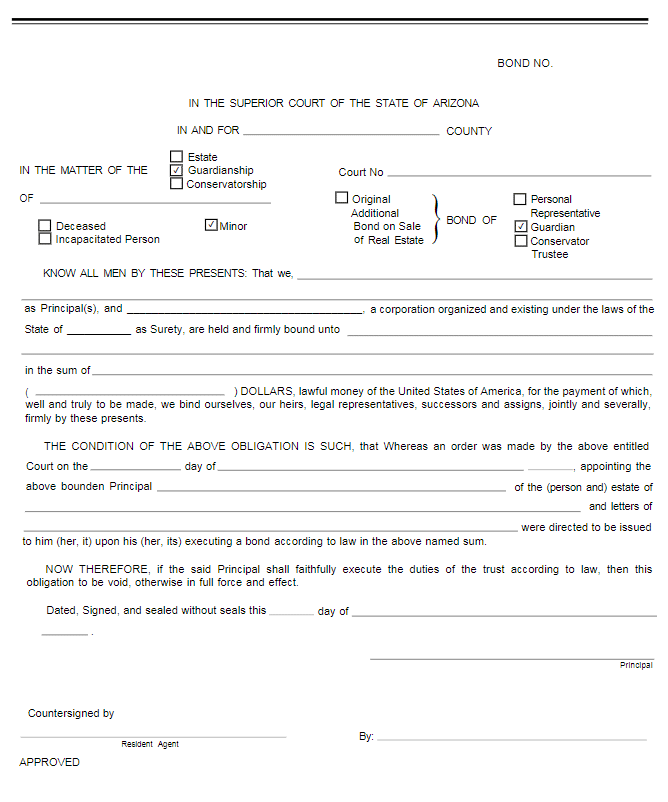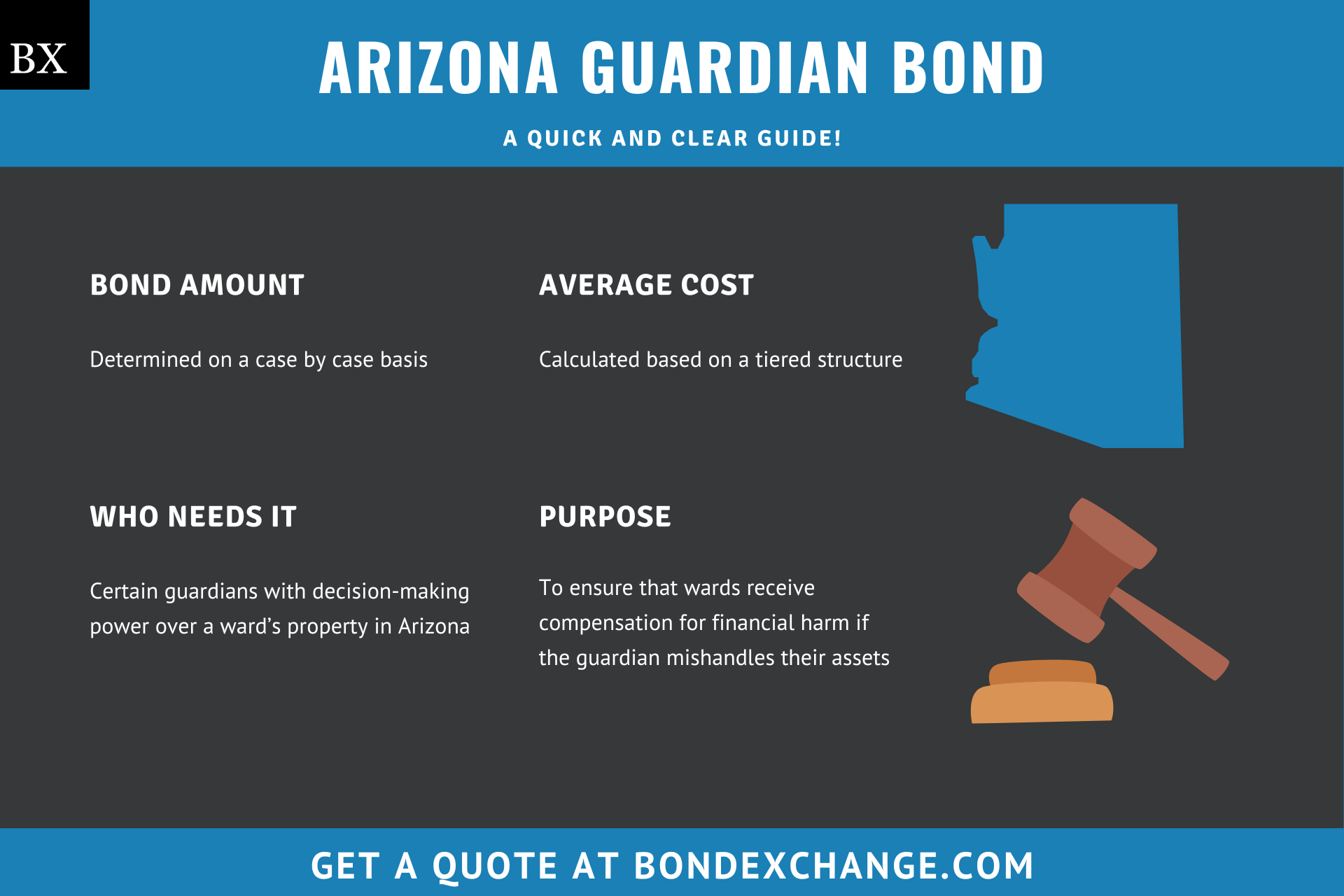Arizona Guardian Bond: A Comprehensive Guide
This guide provides information for insurance agents to help their customers obtain an Arizona Guardian bond. For information on the bonding requirements for Conservators in Arizona, click here.
At a Glance:
- Average Cost: Calculated based on a tiered structure
- Bond Amount: Determined on a case-by-case basis (more on this later)
- Who Needs It: Certain guardians with decision-making power over a ward’s property in Arizona
- Purpose: To ensure that wards receive compensation for financial harm if the guardian mishandles their assets
- Who Regulates Guardian Bonds in Arizona: The superior court of the county where the ward resides or has property

Background
Arizona Revised Statutes 14-5201 and 14-5301.02 require all persons seeking guardianship over a ward to be appointed as a fiduciary by the superior court of the county where the ward resides. The Arizona legislature enacted the appointment requirement to ensure that guardians properly advocate for a ward’s best interests when making decisions related to their health or managing their property. To provide financial security for the enforcement of this requirement, certain guardians that have decision-making power over a ward’s property must purchase and maintain a probate surety bond before becoming appointed as a fiduciary.
What is the Purpose of the Arizona Guardian Bond?
Arizona requires certain guardians to purchase a surety bond as a prerequisite to being appointed as a fiduciary over a ward’s assets. The bond ensures that wards will receive compensation for financial harm if the guardian fails to abide by the regulations outlined in Arizona Revised Statute 14-5105. Specifically, the bond protects the ward if the guardian fails to adhere to all court orders or mismanages their property. In short, the bond is a type of insurance that protects the ward if the guardian fails to fulfill their fiduciary duties.
How Can an Insurance Agent Obtain an Arizona Guardian Bond?
BondExchange makes obtaining an Arizona Guardian bond easy. Simply log-in to your account and use our keyword search to find the “Guardian” bond in our database. Don’t have a login? Gain access now and let us help you satisfy your customers’ needs. Our friendly underwriting staff is available by phone (800) 438-1162, email or chat from 7:30 AM to 7:00 PM EST to assist you.
At BondExchange, our 40 years of experience, leading technology, and access to markets ensures that we have the knowledge and resources to provide your clients with fast and friendly service whether obtaining quotes or issuing bonds.
Not an agent? Then let us pair you with one!

Click the above image to find a BX Agent near you
How is the Bond Amount Determined?
Arizona Revised Statute 14-5411 dictates that the bond amount must be equal to the aggregate value of the estate’s property under the guardian’s control plus the estimated income to be generated by the estate over the next year.
The bond amount may be reduced by the value of any securities deposited that cannot be withdrawn without a court order, any land the guardian can not sell without authorization from the court, or any regular fixed expenses for the ward. Fiduciaries that do not wish to purchase a bond can request to submit other assets such as a pledge of securities or a mortgage of land.
What are the Underwriting Requirements for the Arizona Guardian Bond?
Most surety companies will examine the following factors when determining eligibility for the Arizona Guardian bond:
- Guardian’s credit history
- Whether or not the estate has an attorney
- Whether or not the guardian is a family member
- If the guardian has ever committed a felony
- The guardian’s occupation
- Whether or not the guardian is replacing a prior fiduciary
- If the bond amount is greater than or equal to the estate’s value
- Whether or not there is any ongoing business in the estate
- If a creditor is requiring the bond
How Much Does the Arizona Guardian Bond Cost?
Surety companies typically determine the premium rate for guardian bonds based on a tiered structure. As a result, larger bond amounts will be charged a lower premium rate than smaller bonds.
The following table illustrates the pricing structure for the Arizona Guardian bond:
$1,500,000 Guardian Bond Cost
| Bond Amount | Premium Rate | Total Bond Cost |
|---|---|---|
| First $20,000 | 0.75% | $150 |
| Next $40,000 | 0.60% | $240 |
| Next $140,000 | 0.50% | $700 |
| Next $300,000 | 0.375% | $1,125 |
| Next $1,000,000 | 0.25% | $2,500 |
| Total cost of $4,715 |
Who is Required to Purchase the Bond?
Arizona requires certain guardians to purchase a surety bond as a prerequisite to becoming a court-appointed fiduciary. To paraphrase Arizona Revised Statute 14-1201, a guardian is an individual or organization appointed as a fiduciary over a ward’s person and/or estate. Additionally, “ward” is defined as either a minor or incapacitated adult deemed incapable of making sound decisions concerning their person and/or property.
The court will determine if the guardian must purchase a bond on a case-by-case basis. If the ward owns a substantial amount of assets or income and the guardian has control over the assets/income, the court will likely require the guardian to obtain a bond.

How do Arizona Guardians Become Appointed as Fiduciaries?
Guardians in Arizona must navigate several steps to become appointed as fiduciaries. Below are the general guidelines, but appointees should refer to the appointment statutes for details on the process.
Guardianship over a Minor
Step 1 – Hire an Attorney
Although not explicitly required, it is highly recommended that guardians hire an attorney to assist with the guardianship process.
Step 2 – File a Petition for Appointment
Persons seeking guardianship over a minor must file a petition for appointment with the superior court of the county where the minor resides. Guardians can obtain the petition online here or from the superior court, and must ensure that they verify the petition under oath in front of a clerk or notary public. Parents of a minor can appoint a guardian by will if the minor is unmarried.
Step 3 – Complete a Background Check
Before appointing a guardian unrelated to the minor, the court requires the guardian to submit a full set of fingerprints and complete a criminal background check conducted by the Arizona Department of Public Safety.
Step 4 – Attend a Hearing
Guardians must attend a hearing conducted by the superior court and present evidence as to why the minor is in need of guardianship. The court will examine the evidence presented by the guardian as well as that presented by the minor being evaluated (if any) and make a determination as to whether or not guardianship is necessary.
Any interested person can apply to the court to participate in the hearing. If the court finds basis for an appointment, it will issue a letter of guardianship to the petitioner.
Step 5 – Purchase a Surety Bond
The court, in its sole discretion, may require guardians with decision-making authority over a minor’s property to purchase and maintain a surety bond (limits outlined above).
Guardianship over an Incapacitated Adult
Step 1 – Determine Priority
Priority to serve as a guardian over an incapacitated adult is granted in the following order:
-
- Persons already appointed as a fiduciary over the adult in another jurisdiction
- An individual or corporation nominated by the incapacitated adult if they have sufficient mental capacity
- Persons nominated in the incapacitated adult’s most recent durable power of attorney or health care power of attorney
- The spouse of the incapacitated adult
- An adult child of the incapacitated adult
- A parent or their nominee by the will if they are deceased
- Any relative of the incapacitated adult who has resided with the person for at least six months before the filing of the petition
- Persons nominated by anyone caring for or paying benefits to the incapacitated adult
- The Arizona Department of Veterans’ Services if the incapacitated adult is a veteran or is a spouse/child of a veteran
- A fiduciary licensed under Arizona Revised Statute 14-5651
- A public fiduciary licensed under Arizona Revised Statute 14-5651
Step 2 – Hire an Attorney
Although not explicitly required, it is highly recommended that guardians hire an attorney to assist with the guardianship process.
Step 3 – File a Petition for Appointment
Persons seeking guardianship over an incapacitated adult must file a petition for appointment with the superior court of the county where the adult resides. Guardians can obtain the petition online here or from the superior court, and must ensure that they verify the petition under oath in front of a clerk or notary public.
Step 4 – Complete the Court-Ordered Interview
Once a petition is filed, the court will order the person seeking an appointment to complete an interview with a court-appointed investigator. The investigator will also review where the incapacitated adult will reside if the appointment is granted, and submit a report on their findings which will be used in the hearing (more on this in Step 5). The incapacitated adult must also be interviewed by the court-appointed investigator and by a physician, psychologist, or registered nurse selected by the court.
Step 5 – Complete a Background Check
The court may require persons seeking guardianship to submit a full set of fingerprints and complete a criminal background check conducted by the Arizona Department of Public Safety.
Step 6 – Attend a Hearing
Guardians must attend a hearing conducted by the superior court and present evidence of why the adult is incompetent and in need of guardianship. The court will examine the evidence presented by the guardian as well as that presented by the adult being evaluated and make a determination as to whether or not guardianship is necessary.
Any interested person can apply to the court to participate in the hearing. If the court finds basis for an appointment, it will issue a letter of guardianship to the guardian.
Step 7 – Purchase a Surety Bond
The court, in its sole discretion, may require guardians with decision-making authority over a ward’s property to purchase and maintain a surety bond (limits outlined above).
How do Arizona Guardians File Their Bonds?
Guardians should submit their completed bond forms, including the power of attorney, to the clerk of the superior court with jurisdiction over where the ward resides.
The surety bond requires signatures, including witness signatures, from both the surety company that issues the bond and the applicant. The surety company should include the following information on the bond form:
- Legal name and county of the ward
- Legal name of the entity/individual(s) buying the bond
- Surety company’s name and state of incorporation
- Date the guardian is appointed
- Type of fiduciary relationship
- Court number
- Bond amount
- Date the bond is signed
What can Arizona Guardians do to Avoid Claims Made Against Their Bonds?
To avoid claims against their bonds, guardians in Arizona must ensure that they:
- Perform all of their fiduciary duties
- Obey all court orders
- Do not mismanage the ward’s assets
